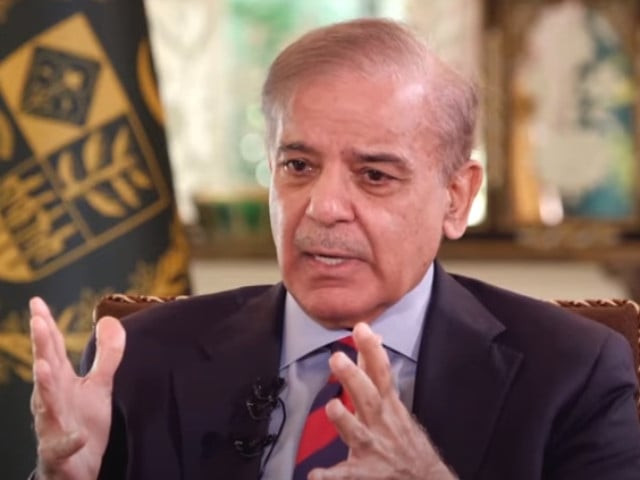PM forms body to finalise new PSDP
Move comes as ministries seek Rs2.8tr in budget for ongoing, fresh schemes

Prime Minister Shehbaz Sharif has constituted a committee to finalize a new Public Sector Development Programme (PSDP) after the ministries demanded a whopping Rs2.8 trillion in the upcoming budget to complete the ongoing projects and kick off over 400 fresh schemes.
Where the ministries have asked for Rs2.8 trillion, the planning and development ministry -- the guardian of the PSDP -- has sought a minimum sum of Rs1.5 trillion in the budget for the fiscal year 2024-25.
The finance ministry on Friday informed the premier that it could allocate a maximum of Rs1 trillion for the PSDP 2024-25.
However, PM Shehbaz termed the amount insufficient and asked the finance ministry to further increase the allocation, according to the ministry’s insiders.
Sources said PM Shehbaz had been briefed about the massive financing needs for development.
Read PM forms cabinet committee on PSDP projects
The premier’s committee has also been assigned the task of developing a consensus between the finance ministry and the planning ministry.
The body has been constituted amid the finance ministry’s inability to determine the development budget envelope for 2024-25 with less than three weeks left in the announcement of the new budget.
The finance ministry is still looking towards the International Monetary Fund (IMF) for its nod to the approval of the sector-wise funds.
The sources said because of the competing demands, limited size of the budget and other development-sector related issues, the premier had formed a nine-member committee to review the allocation of funds for the PSDP.
The body will have a one-week deadline to finish the job, although very little time is left to complete all the procedural and constitutional requirements before the presentation of the budget.
Planning Minister Ahsan Iqbal has been appointed as the chairman of the committee.
The other members include the finance minister, economic affairs minister, petroleum minister, newly inducted Minister of State for Finance Ali Pervez Malik, Planning Commission deputy chairman as well as the finance, communications, power and water resources secretaries.
The idea is to restrict the budget to only core areas of communication, water resources, and climate change.
According to a notification, the committee will review the size, nature, quality, and expected and actual outcomes of the PSDP projects.
It will also identify linkages of the PSDP projects with provincial annual development plans and prioritize national uplift goals.
The sources said the ministries had asked for Rs2.8 trillion in development budget for 1,366 ongoing projects and around 400 new ones.
However, the government is considering not allowing the inclusion of any new project in the PSDP due to severe fiscal constraints.
The ministries demanded a sum of Rs800 billion for the ongoing schemes and Rs600 billion for core nature projects.
The outstanding financial requirements to just complete the ongoing schemes are estimated at close to Rs9 trillion.
For the government, the development funds become the easiest target to finance the unbudgeted recurrent expenses.
The new committee will also find a way forward on deduction from the PSDP funds on account of Cash Development Loans (CDL) recoveries and its adverse impact on the project implementation.
During the ongoing fiscal year, the finance ministry upfront deducted Rs27 billion from the current PSDP -- a move that further aggravated the fiscal woes of the ministries and their departments, particularly the National Highway Authority.
Government sources said it would require at least Rs1.5 trillion in the next fiscal year to implement the project completion related guidelines issued by the National Economic Council.
However, the finance ministry does not have such a large development envelope as it spends 60% of the budget on just interest payments.
The committee will also review the existing mechanism of the Public Private Partnership Authority (P3A) framework.
It will then submit recommendations for making the P3A framework vibrant as well as attractive for federal divisions and the private sector for conceiving and implementing these projects.
The budgetary constraints are also affecting the foreign-funded projects.
Against the allocation of Rs75 billion in this year’s budget, the planning ministry received demands for around Rs300 billion.
The sources said that the ministry diverted savings from the provincial nature projects towards these foreign-funded schemes to provide the cash cover.
Due to limited funding, Pakistan also delayed the implementation of many China-Pakistan Economic Corridor (CPEC) projects.
The Mainline-I project of the CPEC -- the largest railway scheme in the country -- is facing a delay of nearly a decade because of the lack of domestic and Chinese financing.
While speaking at the National Defence University on Friday, Planning Minister Iqbal said the CPEC's initial framework focused on breaking the bottlenecks in the energy and infrastructure sector holding the country back.
He continued that the loss of momentum in CPEC was a dent in all the hard work that led to the initiation of work on Gwadar port, a hospital for the coastal town, its Business Free Zone, resolution of the supply of water and electricity there and its road connectivity with Quetta.



















COMMENTS
Comments are moderated and generally will be posted if they are on-topic and not abusive.
For more information, please see our Comments FAQ